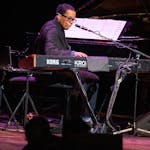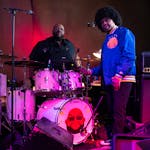Bob Dylan and Kris Kristofferson praised him. Bette Midler and Bonnie Raitt recorded his songs. But singer-songwriter John Prine remained little known if much revered.
Now, however, a new generation of music-makers has discovered the celebrated songwriter. In 2010, My Morning Jacket, Conor Oberst, Sara Watkins and others recorded a collection of Prine's songs. Last year, he recorded duets with a bevy of female singers including Kacey Musgraves, Miranda Lambert and Susan Tedeschi. And this summer, Bon Iver's Justin Vernon, Jenny Lewis and others saluted Prine at the hip Eaux Claires festival in Eau Claire, Wis.
Beloved in the Twin Cities since his debut at the old Guthrie Theater in 1972, Prine, 70, returns Friday at Northrop auditorium. Since he has had two bouts with cancer, he tries to preserve his voice for concerts. So he answered a series of questions via e-mail this week.
Q: On your song "Sabu Visits the Twin Cities Alone," you mention East St. Paul. There is a North St. Paul, South St. Paul and West St. Paul. There is no East St. Paul in Minnesota. How and why did you come up with it?
A: Hmm, poetic license? I make up songs. I'm a songwriter.
Q: This summer you were at the Eaux Claires Festival in Wisconsin with Justin Vernon and others paying tribute to your music. What was that like? How did you like collaborating with those different artists?
A: We had a great time at Eau Claire. Justin really put a lot of work into getting all the artists and performers to do my songs. I can't believe he got Swamp Dogg there to do "Sam Stone" with Jeff Tweedy. That was just great. I had wanted to meet Swamp Dogg ever since I saw a YouTube video of him doing my song. It was a very special evening for me and my family.
Q: What does it feel like to be discovered and revered by a new generation of hipster music-makers? Like some of the folks on the 2010 album "Broken Hearts and Dirty Windows."
A: I'm just honored that these young artists hear something in my music that they can relate to. What's funny to me is that I was as young as many of them are now when I wrote those early songs. On the one hand we have come a long way with technology and everything, but we all still relate to the basic stuff of looking for love, wanting what's right and fair for people, to take care of older people, veterans, the land — it's all the same stuff in the 21st century.
Q: You've played Duluth and La Crosse, among other smaller burgs. What is your affinity for these smaller towns?
A: It's where I come from. I was raised in a working-class suburb of Chicago so I know the territory. In a way, Midwesterners are the backbone of our country — ordinary, working American families. There's a lot that is ordinary about their lives but it's also full of a real richness. That was my family, my parents' families. A lot of my songs and characters come from those places.
Q: What did you think when Bob Dylan said your songs are "pure Proustian existentialism" and "Midwestern mind trips to the nth degree"?
A: I take it as a big compliment even if I'm not entirely sure what it means. I sure do admire Dylan a whole lot. He had a big influence on me, just like he did on others, coming up as a writer in the 1970s. He blazed a trail for a lot of us.
Q: What do you think Dylan's contribution to music in particular and culture in general have been?
A: Basically, I've always thought that Bob Dylan opened the door when there was no door, and then left it open for others to come through. I don't think I'd be a songwriter if it wasn't for him.
Q: What was it like to be discovered by a young Roger Ebert of the Chicago Sun-Times and then realize that he became famous and influential later?
A: Roger was very important to my career — to my success in getting a big audience in Chicago first and I guess ultimately to getting attention from [Kris] Kristofferson, who introduced me to Atlantic Records and my first record deal. I have always been grateful to Roger and was a big fan of his career, too. Roger was a good man.
Q: What's the status of a new album for you?
A: Work in progress.
Q: Why is songwriting so hard for you these days?
A: Because I'm lazy or maybe just easily distracted. I still play a lot of shows, travel a lot. When I'm at home, I enjoy that time with my family, my grandkids. I am writing, though, or at least thinking about it.
Q: How did you like doing last year's duets albums with mostly a new generation of female singers?
A: I had a great time making that record. I love working with my pal Jim Rooney, and it was the first record we put out since the record company has become a family business [following the death of Prine's manager]. Every duet partner on the record is somebody I really admire and have either wanted to work with or record with again — like Iris Dement. Morgane Stapleton is a real talent — that girl can sing, and she brought her dad to the studio to meet me. He's a big fan! Miranda, LeeAnn Womack, Holly Williams — all of them were a joy to work with.
Q: Where does your sense of humor come from?
A: There's very little about life that I don't find in some way humorous or at least kind of goofy. There's surely enough around us to be pissed at but I'm just not that guy.
Q: Where does your love of words come from?
A: The only subject I liked in school was English — the only thing I was really any good at. I read [John] Steinbeck as a young man and loved how he used simple language and characters to tell really powerful stories. I've always loved reading dialogue and how one word can convey so much meaning.
Q: What artists do you listen to these days and what appeals to you about them?
A: I still listen to my all-time favorites like Buck Owens, George Jones, Jerry Lee [Lewis], Van Morrison and new writers like Jason Isbell, Amanda Shires, Sturgill Simpson and Margo Price. Isbell really is in a class of his own. Probably the best new writer I've heard in recent years.
Q: Why did you decide to put together your "Beyond Words" book that was published this year?
A: I'd been talking about a song book for a long time with my business partner/manager Al Bunetta before he passed two years ago. We needed to get straight into a few projects. "For Better or Worse," the duet record, was one and the book was the other. It didn't have a name until we were almost finished putting it all together. I'm really proud of the job we've done in creating and self-publishing the whole thing. The fans love it and I guess that's really what means the most.
Twitter: @JonBream • 612-673-1719






